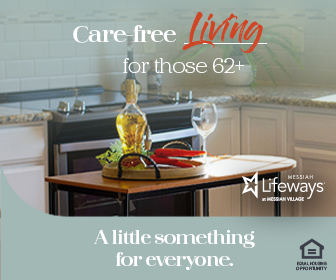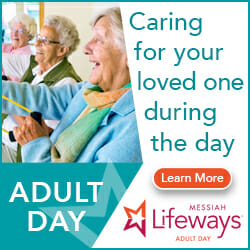“People fear what they do not understand…” –Andrew Smith
You can apply this famous quote by Andrew Smith about unjust fear to a million different things, but today it’s about hospice. Hospice care is often misunderstood and undervalued and November is National Hospice Month, so it’s a good time to review and reflect on what hospice really is and is not. The Pennsylvania Department of Health defines it as the following…
1. Hospice is a special concept of care designed to provide comfort and support to patients and their families when a life-limiting illness no longer responds to cure-oriented treatments.
2. Hospice care neither prolongs life nor hastens death. Hospice staff and volunteers offer a specialized knowledge of medical care, including pain management.
3. The goal of hospice care is to improve the quality of a patient’s last days by offering comfort and dignity.
4. Hospice care is provided by a team-oriented group of specially trained professionals, volunteers and family members.
5. Hospice addresses all symptoms of a disease, with a special emphasis on controlling a patient’s pain and discomfort.
6. Hospice deals with the emotional, social, and spiritual impact of the disease on the patient and the patient’s family and friends.
7. Hospice offers a variety of bereavement and counseling services to families before and after a patient’s death.
The explanations above are well put and clear, but a bit academic. Therefore to further understand hospice, I think it is also important to explain what it is not. Having interacted with a number of hospice agencies and their staff, plus my own personal experience with hospice for my grandmother and mother-in-law, I feel like I can speak objectively about it.
• Hospice is not a death sentence. Quite frankly, the terminal illness dictates one’s fate. Hospice care is there simply to support the medical, emotional and spiritual needs of the patient and their loved ones. But because they initiate their services at such a difficult juncture, the preconception is that hospice is doom and gloom, when in reality the doom and gloom is the illness itself.
• Hospice is not just for cancer patients. Hospice provides care to terminally ill patients with a wide range of illnesses including cancer, advanced cardiac disease, advanced neurological disorders, AIDS, ALS, Multiple Sclerosis, Liver Disease, Renal Disease, end stage dementia, and any end stage disease.
• Hospice is not a substitute for the family or the family’s care. Caring for a terminally ill loved one can be very challenging and draining. And like most services coming into the home, hospice is a great way to supplement or complement the care that the family is providing.
• Hospice is not expensive. Hospice is covered through Medicare, Medicaid, and most other insurance providers with a physician order and for as long as hospice care is needed.
• Hospice is not a form of euthanasia. Hospice does not administer drugs that hasten death and the withdrawal of curative drugs or treatments are done so with careful consideration. They do receive medications to help reduce pain and discomfort and may continue maintenance medications such as insulin for as long as they are necessary.
• Hospice is not a place to send dying people so they won’t have to know what is happening to them. As with any medical decision if a patient is able to, they can make the choice to utilize hospice. They also typically have these services come to their own home, but can also receive it in a skilled nursing facility, personal care home, assisted living facility, independent living, and/or hospital.
• Hospice is not limited to the 6 month terminal illness diagnosis. Hospice services can extend well beyond 6 months as long as their physician certifies the need.
• Hospice is not a resignation to hopelessness or helplessness. Patients have the freedom to drop hospice services at any point and in some cases patients can actually rally and no longer need hospice because of an improvement in their condition.
In the absoluteness of death and if ever faced with a terminal situation, the idea of having caring professionals supporting you, your family and friends should instill feelings of comfort and relief and not ones of fear and despair. For more information about hospice services in Pennsylvania, go to the Pa Department of Health link for hospice.






